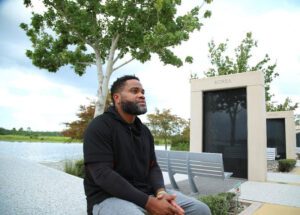In the heart of Orlando, Florida, where sunshine and palm trees paint a picture of tranquility, there exists a place that holds the stories of courage, resilience, and recovery. The Orlando VA Health Care System (OVAHCS) is not just a hospital; it’s a beacon of hope for Veterans battling addiction. In a world where overdose rates continue to rise, the OVAHCS stands as a symbol of commitment to overdose awareness, prevention, and support for those who served our Nation.
 One such story comes from Michelson Joseph, a Marine Corps Veteran and resident of the Orlando VA Health Care System (OVAHCS)’s domiciliary.
One such story comes from Michelson Joseph, a Marine Corps Veteran and resident of the Orlando VA Health Care System (OVAHCS)’s domiciliary.
Earlier this year, Joseph returned to using substances that resulted in an accidental overdose. However, he did not let this setback define him. Instead, he used it as motivation to seek help and turn his life around. Joseph shares his story to encourage others who may be struggling with addiction to seek the support and resources they need to overcome it.
Overdose-related deaths have reached alarming levels in the United States, impacting individuals from all walks of life. Veterans, too, have not been immune to this crisis. The experiences that a service member goes through before, during, and after their military service play a significant role in the pain and stress they may encounter. Recognizing the urgent need to address this issue within their community, the OVAHCS has taken significant steps to ensure that Veterans facing addiction receive the help and support they deserve.
Joseph deeply values his faith, stating, “I have always held God close to my heart and grew up in a loving home.” His strong faith has been a guiding force throughout his life. “I believe that my faith has helped me stay grounded even in the face of adversity.”
Following his military service, Joseph began experimenting with marijuana. Unfortunately, his drug use didn’t stop there, and he eventually tried MDMA (Molly) which greatly affected his life in many ways. Joseph was aware that something was not right with his body and wanted to ask for help, but the shame and guilt he had about returning to use kept him isolated. Although Joseph briefly considered using a knife to cut himself, he ultimately decided not to do so. He agreed to visit the hospital for medical reasons and was later diagnosed with kidney failure and dehydration.
Joseph was hospitalized for several weeks and underwent dialysis before he was released. Despite this, he acknowledged that he required additional treatment and opted to go through a screening process for the domiciliary at the OVAHCS in Lake Nona. This would allow him to sustain his progress toward recovery and establish constructive habits regarding his mental health and substance use.
Joseph’s treatment not only improved his health but also cultivated a sense of camaraderie among individuals facing similar situations. Veterans come together to provide encouragement, share life lessons, and support each other in moving forward.
“It’s been on my mind that I can help people. I would like to someday be a counselor to give back to my fellow Veterans,” says Joseph.
“One of the cornerstones of overdose prevention at the OVAHCS is education,” said Dr. Cassandra Davis, OVAHCS Mental Health Clinical Pharmacist. “Staff at the domiciliary do a great job in organizing group sessions to equip individuals with knowledge and empower them to make informed decisions and reach out for help when needed.”
Joseph speaks from personal experience when he says, “Do not try drugs in the first place; it’s nothing but shame and disappointment. If you’re currently struggling with drug use, seek help and be open to accepting it.”
“We encourage Veterans in recovery to become mentors and to advocate for others facing addiction, said Davis. “The camaraderie among those who have walked similar paths fosters a sense of belonging and shared purpose.”
Davis emphasizes that the stigmas surrounding mental health and substance use are at play for most Veterans in need of help.
“It is all about love and reminding others that everyone is human and deserves support,” she said. “By promoting love and support, we can break down barriers and provide those who need it with the resources and assistance necessary for their wellbeing.”
Davis further explains that if you are ever in a crisis, knowing resources like the National Suicide Prevention Lifeline or Crisis Line available at 988 (press 1 for Veteran’s Crisis Line) or preferably using a safety plan created with your healthcare team can assist with coordinating safety.
“If there is a potential intentional or accidental overdose, calling 911 should always occur,” said Davis. “It is also advisable to have naloxone on hand in preparation for an overdose of opioids; this is recommended for those with access to prescription opioids or use of non-prescribed substances which may be laced/cut with opioids and accidental ingestion can occur.”
Davis explains that Naloxone works by swiftly reversing the overdose and blocking the effects of opioids.
“It is still very important to call 911 to ensure other care is coordinated,” said Davis. “This life-saving medication is available as an easy-to-use nasal spray and can be obtained without a copay for eligible Veterans through the VA.”
Veterans seeking help at the OVAHCS are met with compassion and understanding. The medical staff, counselors, and support groups work together to create personalized treatment plans that address the unique needs of everyone.
“At the OVAHCS, our focus is not just on sobriety but on rebuilding lives and fostering resilience,” said Dr. Kara Boyer, OVAHCS Deputy Chief Mental Health.
Joseph Nunez is the Public Affairs Specialists at Orlando VA Health Care System. Pictured in photo: Michelson Joseph, Marine Corps Veteran at the OVAHCS Domiciliary.


